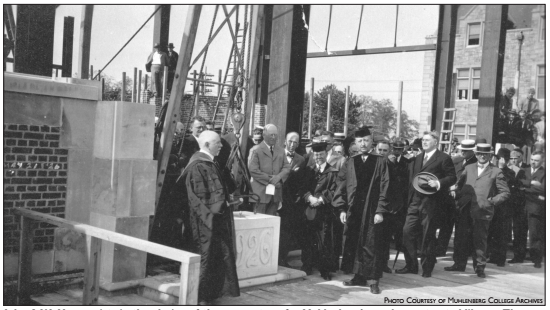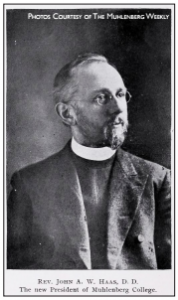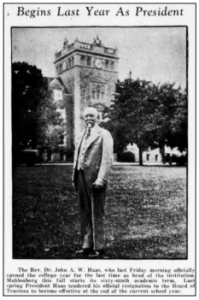
“This Week in Muhlenberg College History” will bring to light past events, individuals, and forgotten aspects of Muhlenberg history that have been buried within the College’s 169 years of existence.
Whether you know it from its famous clock tower, recent construction, or were even temporarily confused by its title of “LIBRARY” over the doors, every Muhlenberg student knows of the Haas College Center. Very few, however, know the story of John A. W. Haas, fourth president of Muhlenberg College. As the Ciarla boasts in his first appearance as then President-elect, “Dr. John A. W. Haas is one of the foremost scholars and educators of the Lutheran Church in America.”
Born in Philadelphia during the heat of the Civil War , John A.W. Haas was the son of the notable educator John C. Haas. Following in his father’s footsteps, Haas would go on to get degrees from University of Pennsylvania and the Lutheran Seminary in Mount Airy. In 1888, he received his final degree from the University of Leipzig and was ordained a Lutheran Minister in New York City. In 1891, he married Charlotte Boschen, daughter of prominent Lutheran Publisher George D. Boschen. A man of devout faith and notoriety, the Board of Trustees easily appointed Haas as interim president after the sudden death of Muhlenberg’s second president, Theodore Seip in late 1903. Haas inherited a small college with a student body less than 100, a humble endowment equal to the college’s debt, and was now heading the ongoing process of moving the college to the West End of Allentown, its current location. The college’s low endowment and high construction costs led to all eyes being on Haas’ leadership. A man of high intelligence and relatively young at the age of 41, Haas knew he had to make major changes and take Muhlenberg into the 20th Century. In his inaugural address to the College, now President Haas stressed the importance of the sciences in a 20th century world. While many colleges were still based around the classics of Greek and Latin, Haas grew the college to include pre-med and pre-law programs. He also founded the “Extension School,” now Wescoe School, for the instruction of secondary school teachers; the school would even allow women to attend teacher training though they did not graduate with a Muhlenberg degree.

During his 32 year tenure, the longest in Muhlenberg’s history, Haas continued his faith and Lutheran scholarship, but also tried to modernize the college to emerge it as a leader of 20th Century liberal arts colleges. He kept Muhlenberg to its Lutheran roots with weekly religious sermons on anything from social, political, or economic aspects of American life. In one speech, Haas encouraged the Muhlenberg Men to go to the movie theater less and instead use that time for silent reflection, prayer, and study. Though still very much a product of his old-school Lutheran upbringing, Haas was still a president of the people and was adored by students and faculty alike. By the end of his tenure, Haas was moreso seen as the campus grandpa instead of an elusive president. He was even given the nickname of “Pappy” and was known to use his cane to rap the desks of sleeping students. He once came up behind a sleeping Jack Blair ‘38, and after slapping the desk with his cane proclaimed, “The library is not a place for sleeping, it is a place for books!” Even when he would take time off from Allentown and retire to his Poconos cottage, he would still phone and write to the College daily.
In the summer before his final year at Berg, tragedy struck the Haas family. While vacationing in his Poconos cottage, the house erupted in flames in the early morning hours. Mr. and Mrs. Haas ran from the building, unaware President Haas’ sister was still trapped inside. After both neighbors and firemen fought back the fire, it was clear his sister had not survived. The fire was not only a great personal loss for Haas, but an academic one. The fire also claimed many of his books and manuscripts as well as a draft of his newest book.

In his first year, Haas expressed his vision of a “Greater Muhlenberg” – he achieved this financially, academically as well as physically. In his last year at Muhlenberg, the incoming freshman class was at 150, larger than the entire College’s enrollment at the beginning of his term. Enrollment grew to 400-500 students and 32 faculty. Nearly eliminating the College’s debt, the endowment was raised to nearly $1 million and the entire College was valued at over $3 million. Apart from finances, Haas oversaw the relocation of the college, the completion of East hall and Ettinger Building, as well as the building of Egner Chapel, Trumbower Science Building and the aptly named Haas College Center, then the College Library.
President Haas retired as Muhlenberg’s president after the 1935-36 academic year, ending his record tenure. He passed away the following year while vacationing in upstate New York. His legacy has been remembered through not only the name of the College Center, but also The Dr. John A. W. Haas Award scholarship, given to a Junior who has proved outstanding scholarship during their three years at Muhlenberg.
Karl Schultz is a Senior with a History major, German minor, and a certification in secondary education. He began writing for the Weekly his freshman year after his roommate, now Editor-in-Chief, forced him to. He mainly writes about Muhlenberg College's forgotten past through his "This Week in Muhlenberg History" segment.





















